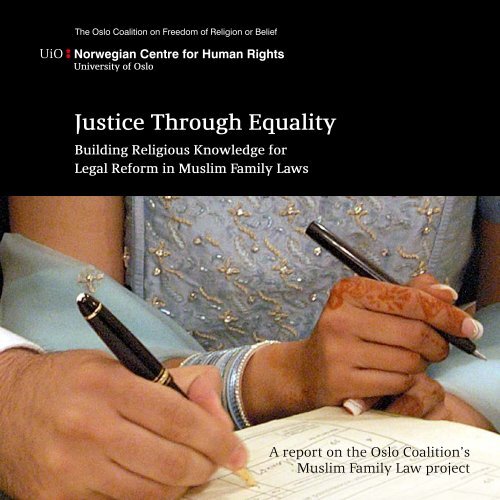
Justice Through Equality: Building Religious Knowledge for Reform of Muslim Family Laws
Author: Ziba Mir-Hosseini, Kari Vogt, Lena Larsen, Christian Moe Publisher: The Oslo Coalition on Freedom of Religion or Belief Language: EnglishA Report on the Oslo Coalition’s Muslim Family Law Project
About this report
The Oslo Coalition is an international network of experts and representatives from religious and other life-stance communities, academia, NGOs, international organisations and civil society, based at the University of Oslo and funded by the Norwegian government. It carries out a number of projects to promote freedom of religion or belief worldwide. Since 2004, the Oslo Coalition project ‘New Directions in Islamic Thought’ has organised six international workshops and produced two books on burning issues of reform from within the Islamic tradition: New Directions in Islamic Thought (ed. Kari Vogt, Lena Larsen and Christian Moe, London: I.B. Tauris, 2009) and Gender and Equality in Muslim Family Law (ed. Ziba Mir-Hosseini, Kari Vogt, Lena Larsen and Christian Moe, London: I.B. Tauris, 2013) – referred to below as NDIT and GEMFL respectively.
In 2008–2012, the project brought together a diverse group of Muslim experts to discuss gender equality in Muslim family law. They included religious scholars; experts in the social, human and legal sciences; and NGO activists. All shared a commitment to engaging with the Islamic tradition to bring about reform consonant with modern understandings of justice. We held three international workshops in Marrakech and Cairo, and published the book GEMFL, on which this report is based.
The report is intended for policy-makers, stakeholders and advocates of reform who are developing knowledge-based arguments for legal reform. It sums up lessons we have learned from the expert discussions and written contributions, and places some of the key arguments into an editorial synthesis.
We have not sought to develop a consensus statement, and the individual authors cited are not responsible for each other’s arguments, for the particular use we have made of their own work, or for any errors in the presentation. For the full version of the key scholarly findings and arguments as developed by the expert participants, and the evidence and literature they cite, please see the book chapters and other key resources referenced under “Further reading” in each section.
The Oslo Coalition on Freedom of Religion or Belief
Norwegian Center for Human Rights
PO Box 6706 St. Olavs plass
NO-0130 OSLO
office [at] oslocoalition [dot] org
Back